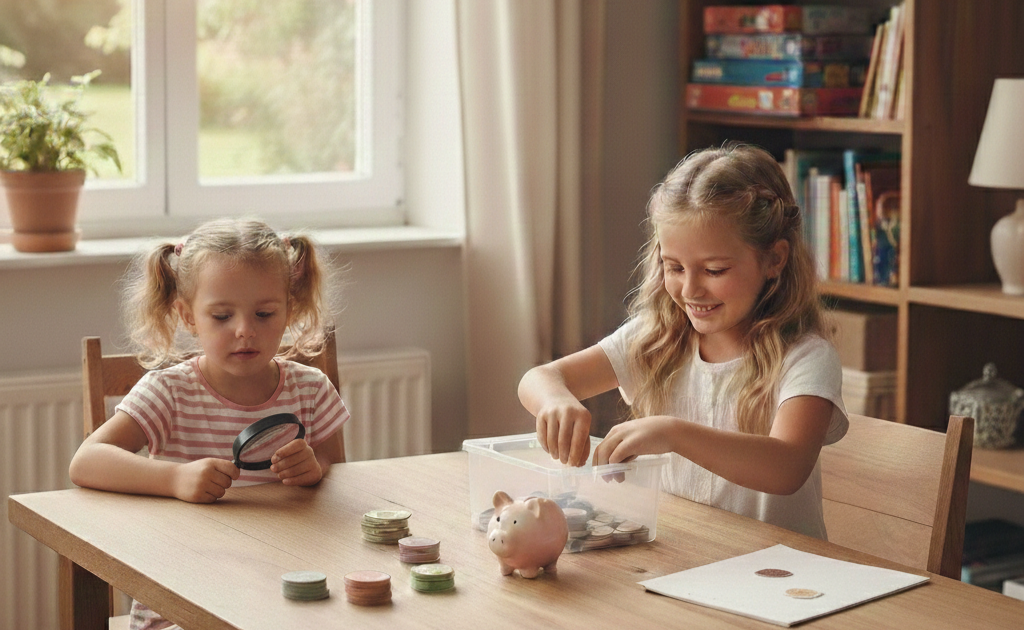Ever since I became a mum, I’ve been thinking about how I can teach my child how to handle money in a healthy way. I’ve read a lot of articles, attended informational events and have done a lot of research on the subject. In this article, I share my experiences and the insights that I find particularly valuable.
Handling money correctly is not an innate skill, but one that needs to be learnt. You should give your child the following skills:
- Managing money and prioritising
- Waiting for things or doing without
- Only spend money that they have themselves
- Know what costs they can expect in life
You can teach these skills with these tips:
1. Be a good role model for your child
Children and young people learn by observing and imitating. Therefore, reflect on your own handling of money again and again.
Speak your thoughts out loud. This allows your child to participate in your thoughts, understand and comprehend your decisions.
Example: You go shopping for lunch and see particularly beautiful napkins on display in the shop. You resist the impulse to put them in the shopping basket and explain to your child: ‘Oh, I like these napkins. I’d love to put them in the basket straight away, but I’m here to buy our lunch. I still have enough napkins at home.’ Then you move on.
Your child has realised that you have just resisted an impulse and has been able to observe how you have dealt with it.
2. Talk to your child about money in an age-appropriate way
Everyday family life offers many opportunities to talk about money and teach mindful behaviour. The best way to do this is to use situations where money is visible or part of a decision, for example when grocery shopping.
Even small children can be introduced to money in a playful way. Through observation, even the little ones learn about its function as a means of exchange, for example in the supermarket.
From the age of 4, children can understand that you can’t have everything immediately and that sometimes you have to wait. From this age, you can start talking to your child about money.
At school age, children learn about the different denominations of notes and coins. You can start here and take the opportunity to teach your child about the cost of living. It’s best to have regular conversations with your child about this so that they gradually understand what costs they can expect in life.
3. Ask your child about their wishes
Take an active interest in your child’s consumer wishes. Make a wish list together and consciously consider it. Ask your child the following questions:
- How much does each item on the wish list cost?
- Why do you want it?
- Why do you want it right now (especially if it’s an impulse wish)?
- What would you give up for it?
- Is it worth it to you?
4. Don’t fulfil every wish immediately
Children are very susceptible to consumer stimuli. This makes it all the more important that you don’t fulfil your child’s every wish immediately. Instead, help your child to wait and prioritise. This teaches children to budget and save money. Taking time to decide what to buy often also prevents bad purchases.
5. Let your child gain experience with money
Your child needs guidance when learning how to handle money. However, don’t make every decision for them, but let them experience it for themselves. Both good and bad experiences are important. Mistakes can be learnt to be corrected and bad decisions made as a child are usually less serious than those made as an adult.
Here you can find out more about how to support your child financially at different stages of life.
6. Look for solutions together
It is better to build trust than to spoil your child with consumer goods. Give your child time instead of things. Think about things together:
- What is important to you personally?
- What is valuable to you?
- What makes you happy?
- Are there valuable things that cost nothing?
Don’t remove all obstacles on your own, but look for solutions together with your child.
7. Give your child responsibility
Giving your children responsibility motivates them. A small child can look after the wallet while you are shopping and pay at the till at the end (I recommend cash). Later, they can go to the bakery and buy their own bread rolls. The child will take responsibility for their own money when pocket money is introduced or later with the youth wage.
Unexpected positive effects on their own behaviour
The more I thought about what I wanted my son to do with money, the more mindful I became in dealing with my own finances. Of course, I don’t manage everything every day and with all these principles, there has to be room for exceptions in between. Nevertheless, I have noticed how my own behaviour has improved as a result.
If you succeed in at least tip 1 (being a good role model), then you’re on the right track!
Finally, I’d like to recommend two other websites that I found useful during my research: moneychat.ch and projuventute.ch/geld-konsum.
If you find my tips helpful, I’d be delighted if you subscribed to our monthly newsletter!




